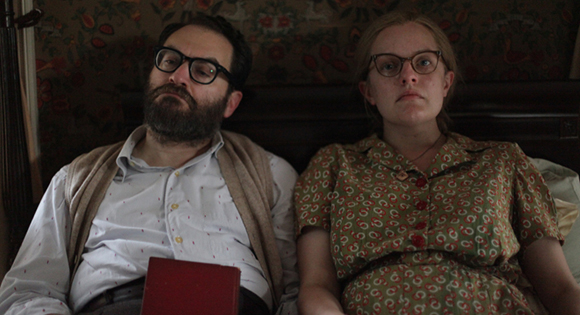Filmmaker Josephine Decker has already ably plumbed the depths of a fragmenting, creative teenaged mind in her disorienting debut feature Madeleine’s Madeleine. Now, in her daring follow-up, Decker has set her sights on excavating the labyrinthine inner life of Shirley Jackson, one of literature’s most curious personalities. With a script by Sarah Gubbins based on Susan Scarf Merrell’s novel, the resulting fever dream, Shirley, might be confounding to viewers who know little to nothing about this notoriously disagreeable novelist. But for Jackson’s fans and admirers, it will satiate as a deliciously dark fable in the key of Jackson’s finest fiction. Not exactly a biopic, Shirley is instead a mostly fictional fugue on themes of mortality, misogyny, and madness, an imaginative and creepy riff on Jackson’s storied legacy in all its complicated, brittle, and fabulating glory.
At the center of this tall tale is Elisabeth Moss’ characteristically precise embodiment of Jackson, all sneers and stares, ready with a sharp takedown but nursing deep layers of pain beneath the prickles. On the 1960s Bennington College campus she keeps a chilly home with her professor husband, Stanley Hyman (Michael Stuhlbarg), himself highly respected among the students but strangely sinister around the house. By now, the reclusive Jackson has gained notoriety for her disturbing short stories, but she is eager for her big break as a novelist. It’s clear from the outset that her desire to pen perfect prose, combined with Hyman’s open criticism of her craft, is her regular undoing.

Enter Fred and Rose Nemser (Logan Lerman and Odessa Young), wide-eyed, young newlyweds whose good looks and open-hearted innocence butt up immediately against the fiery wit of the grizzled, sardonic older couple. Fred, freshly finished with his dissertation, has arrived to assist Hyman for the semester. Within days, Hyman has also asked Rose if she might provide some cleaning and cooking assistance, as the housekeeper has left and Jackson is suffering a bout of depression. The eager Nemsers move in and thereafter, while Fred attempts to gain the favor of Hyman in the classroom, Rose falls deeper and deeper under the spell of the mercurial Jackson. The women form a tenuous bond that begins to unravel each of their hidden desires and secrets.

Most of the fun of watching Shirley lies in wondering what is actually factual, what is the invention of the artists at the helm, and what are the delusions of the increasingly connected Jackson and Rose. Easter eggs abound in scenes where the characters encounter plot threads, details, and personalities lifted straight out of the real life Jackson’s body of work. Most strikingly, as Jackson hurtles toward developing an idea for what became her real life second novel Hangsaman, and as it becomes clear that there is another woman whose presence and disappearance haunts the proceedings, the fictitious Rose becomes a stand-in for the missing young woman at the center of that loosely fact-based story, further muddying the mysterious waters.
If all of this sounds puzzling, it is. But making sense of it all is not the point. Much like Jackson achieved with her anxiety-inducing stories, Decker’s film wants to get under the viewer’s skin and stay there, burrowing like a weevil and eating its way back out from the inside. It’s an exercise in nightmare logic, showcasing the nasty Jackson in such progressively vulnerable, terrified states that it soon becomes impossible to ignore the true suffering at the core of her misanthropy. Meanwhile Rose interrogates her own paranoia, ultimately gaining more and more confidence that launches her into a self-assured state she’s never known before. While the funhouse mirror distorts and transforms these women’s images, they become symbols for how society consumes, chews up, and spits out all women, whether they be charismatic artists, meek housewives, or anything in-between.
The surface mystery that propels Shirley’s plot never truly coheres into a satisfying takeaway, but the journey haunts. By the film’s end, the themes that Jackson continually mined in her own fiction -- the horrors of everyday life, the dread that we fight so hard to avoid, the willful myopia of men, the murky paths women must forge -- are explored from multiple energizing angles. Jackson desperately wanted us to pay attention to our fears, and this film wants us to pay attention to the enduring importance of her obsessions. The effectiveness of Shirley’s contrapuntal layers are difficult to clearly describe, much like those in Jackson’s own creations or in a disagreeable sacred text that chafes our cheer, but these motifs will continue to tug eerily at the psyche, inviting a neverending unease that Jackson herself would have eagerly welcomed.
